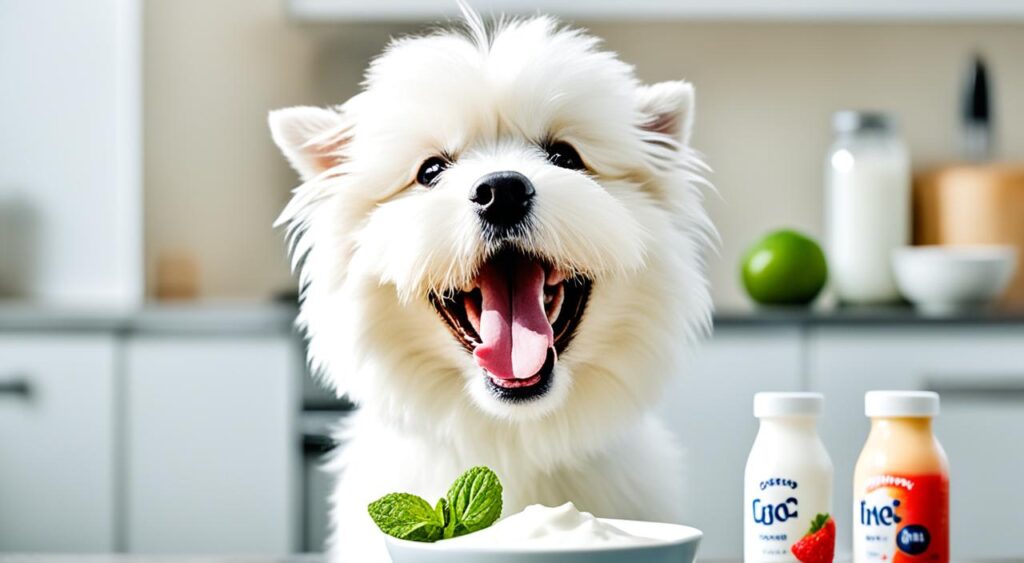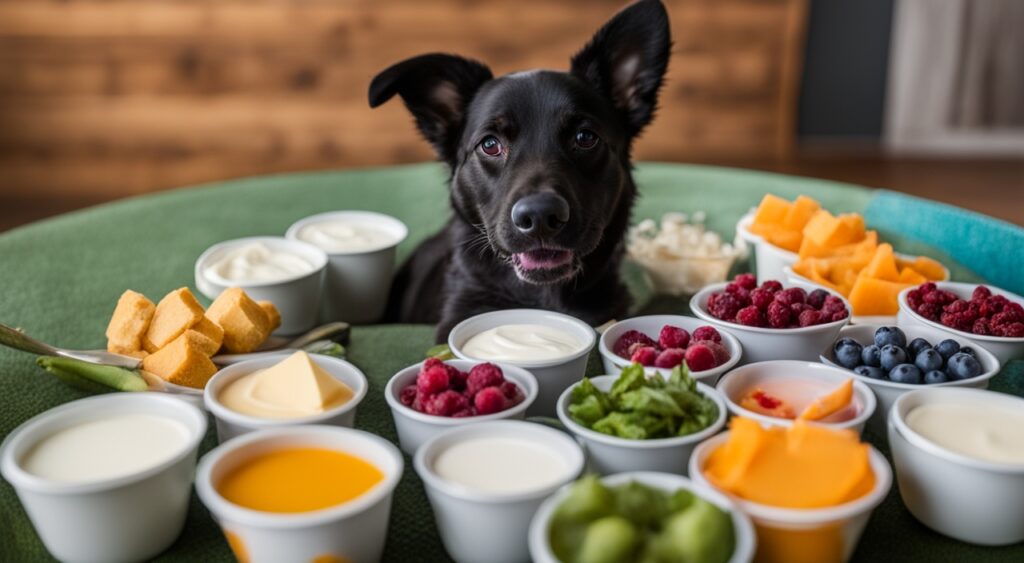
As pet owners, we often wonder if human foods are safe for our dogs. Yogurt is a common item we question. But is it safe for dogs to eat? The answer depends on the dog’s diet and how much they can handle.
Plain, unsweetened yogurt can be good for dogs. It has protein, calcium, and probiotics that help their gut health. This is important because 70% of a dog’s immune system is in their gut1. But, dogs can’t handle lactose well, so some yogurts might upset their stomachs1.
Choosing the right yogurt for dogs is important. Greek yogurt is a good choice because it has more protein and probiotics2. Regular yogurt is also good, with more calcium and fewer calories1.
Key Takeaways
- Plain, unsweetened yogurt can be a dog-friendly treat when provided in moderation.
- Yogurt can deliver essential nutrients such as dietary protein, calcium, and probiotics beneficial for dog health1.
- A cautious approach is recommended due to common lactose intolerance in dogs1.
- The type of yogurt chosen for a dog’s diet matters—Greek yogurt may offer more benefits due to higher protein levels2.
- Serving size matters; larger dogs can generally have more yogurt than smaller dogs, with recommended portions carefully detailed2.
- Always avoid yogurts with added sugars or artificial sweeteners harmful to dogs2.
Understanding Yogurt’s Role in Canine Nutrition
Yogurt is a common food for humans, packed with probiotics, protein, and calcium. But, its role in a dog’s diet is less clear. Dogs can’t digest lactose well after they are puppies. So, yogurt might not be good for them3.
Still, yogurt can be good for dogs if given carefully. Plain, Greek-style yogurt is a good choice because it has less lactose3. Greek yogurt also has more protein and less lactose than regular yogurt, making it better for dogs4.
When adding yogurt to a dog’s diet, be careful. You need to think about the dog’s size, weight, and health. Too much yogurt can upset their stomach or cause pancreatitis because of its fat content3.
Also, avoid yogurt with xylitol, a sweetener that is bad for dogs. It can cause liver failure. Always talk to a vet before giving yogurt to your dog. They might suggest probiotic supplements made just for dogs35.
| Yogurt Type | Protein Content | Lactose Content | Recommended Serving |
|---|---|---|---|
| Regular Yogurt | 5 grams | Higher | Small amounts occasionally |
| Greek Yogurt | 10 grams | Lower | Varies based on dog’s condition4 |
| Plain and Xylitol-Free Greek Yogurt | 10 grams | Lowest | Preferred choice, consult vet3 |
In conclusion, yogurt can be a healthy snack for dogs if used wisely. Plain Greek yogurt without bad additives can be good for their diet. It gives them nutrition and helps their stomach5. Always talk to a vet before changing your dog’s diet.
Can Dogs Eat Yogurt? Answering Your Top Concern
Adding dog-friendly yogurt to your pet’s diet is a good idea, but you must think about the good and the bad. This ensures that yogurt and dog health work well together.
The Historical Digestive Adaptation of Dogs
Dogs have changed a lot since they were first domesticated. Young puppies could digest milk because they had an enzyme for it. But as they grow, most lose this enzyme and can’t handle lactose well. Knowing this is key when thinking about giving your dog dairy products like yogurt.
Identifying Lactose Intolerance and Dairy Allergies in Dogs
Some dogs can handle lactose better than others. But many show signs of intolerance or allergies, like diarrhea, gas, and bloating67. Watch how your pet reacts to dairy products closely. Consider giving them plain, unsweetened yogurt with live cultures and no xylitol6. Xylitol is a sweetener that is toxic to dogs, even in small amounts7.
Probiotics in Yogurt: Are They Beneficial for Your Pet?
Yogurt has probiotics like Lactobacillus acidophilus and Bifidobacterium. These can help with digestion and boost immunity6. But these probiotics don’t help dogs as much as they do humans. If your dog can handle lactose, adding a little bit of dog-safe yogurt can be good for them.
For a good balance, remember the 10% rule. Treats like yogurt shouldn’t make up more than 10% of your dog’s daily calories67. Always choose yogurts that are safe for dogs. Make sure they don’t have artificial sweeteners or too much sugar6.
| Yogurt Feature | Benefit for Dogs |
|---|---|
| Low lactose content | Lesser risk of digestive issues |
| Rich in probiotics | May aid in digestion and immunity |
| Calcium enriched | Supports bone health |
| Plain, no additives | Safer for dogs with sensitivities |
When adding yogurt to your dog’s diet, talk to a vet if you see any bad effects or have diet concerns about your pet7.
Benefits and Risks of Yogurt in Dog Diets
Adding yogurt to a dog’s diet has many benefits, but it’s important to watch out for risks. Yogurt is great because it’s full of protein, which helps with tissue repair and overall health. It also has calcium, which is key for strong bones8. Plain, low-fat Greek yogurt is best because it’s more protein-rich and easier for dogs to digest than regular yogurt8.
But, there are risks to consider with dog yogurt. Many dogs can’t handle lactose well, especially as they get older. This can cause diarrhea, gas, and bloating98. Also, some yogurts have xylitol, a sweetener that’s very bad for dogs. It can cause liver failure or even death if eaten too much98. So, always check the yogurt’s ingredients for your dog’s safety.
Some yogurts are also too fatty, which can be bad for dogs. High-fat diets can lead to pancreatitis in dogs. So, choose low or non-fat yogurts to avoid this problem8. Start with a little yogurt and watch how your dog reacts to it to catch any issues early9.
It’s important to know how to balance yogurt in a dog’s diet. Yogurt should not make up more than 10% of your dog’s daily calories to prevent weight gain10. Always talk to a vet before adding new foods like yogurt to your dog’s diet to make sure it’s right for them910.
Even with its benefits, yogurt comes with risks that need careful attention. With the right guidance and moderation, yogurt can be a good addition to a dog’s diet. It can help with digestion and overall health if chosen and given in the right amounts.
Yogurt Varieties: Which Types Are Safe for Dogs?
Choosing the right type of yogurt for your dog is important. It’s about giving them a healthy treat without risks. You want to make sure they stay healthy.
Comparing Greek, Regular, and Non-Dairy Yogurt
There are three main types of yogurt for dogs: Greek, regular, and non-dairy. Greek yogurt is great because it has more protein and fewer carbs. This helps with muscle health and overall wellness11. It also has less lactose, which is good for dogs that can’t handle lactose well12.
Regular yogurt is packed with calcium, which is good for strong bones and teeth. But, it has more calories than Greek yogurt12.
For dogs with lactose issues, non-dairy yogurts like coconut or oat-based ones are a good choice. Brands like Oatly offer options that are free from lactose and soy12. Always pick unflavored or plain yogurt to avoid added sugars and artificial sweeteners that can harm dogs.
The Perils of Sweetened and Flavored Yogurts
Sweetened and flavored yogurts can be bad for dogs because of the sugars and artificial sweeteners. Xylitol, a sweetener in some yogurts, is especially dangerous and can cause serious health problems in dogs. Always check the ingredients to avoid these harmful additives.
Remember, treats like yogurt should only be a small part of a dog’s diet13. Only give a few tablespoons a day, based on your dog’s size and energy needs13.
| Type of Yogurt | Protein | Carbohydrates | Calcium | Suitable for Lactose Intolerance |
|---|---|---|---|---|
| Greek Yogurt | High | Low | Low | Yes11 |
| Regular Yogurt | Medium | Medium | High12 | No |
| Non-Dairy Yogurt | Varies | Low | Low | Yes12 |

When picking between Greek, regular, and non-dairy yogurts, think about what’s best for your dog’s health and any allergies or sensitivities. Choosing the right yogurt can be a great way to add good probiotics and nutrients to your pet’s diet.
Discerning Healthy Portions: How Much Yogurt Can Fido Have?
Adding yogurt to a dog’s diet is a good idea, but it’s important to know the right amount. Dogs can enjoy yogurt as a treat, but it should fit their size and caloric needs.
Guidelines for Yogurt Consumption Based on Dog Size
Yogurt portions for dogs depend on their size. Small dogs get 1 teaspoon a day, medium dogs 2 teaspoons, and large dogs 3 teaspoons. Remember, treats should make up no more than 10% of a dog’s daily calories to keep their diet balanced.
Integrating Yogurt Into Your Dog’s Diet Safely
When adding yogurt to your dog’s diet, start with small amounts and watch how they react. Not every dog can handle dairy well, so keep an eye on them. Yogurt can be a tasty, probiotic-rich treat, but your vet might recommend special dog probiotics for better health benefits14.
| Dog Size | Yogurt Portion | Recommendation |
|---|---|---|
| Small ( | 1 teaspoon | Daily, as treat |
| Medium (20-50 lbs) | 2 teaspoons | Daily, as treat |
| Large (> 50 lbs) | 3 teaspoons | Daily, as treat |
Yogurt is a tasty snack with health perks, but it can’t replace a balanced diet. Make sure to add yogurt to your dog’s diet in the right amounts as part of a healthy meal plan. This helps keep them happy and healthy.
Symptoms of Dairy Intolerance and Allergy in Canines
It’s key to know about lactose intolerance in dogs and symptoms of dairy allergy in dogs for their health. Lactose intolerance often shows as bloating, diarrhea, and vomiting15. Dairy allergies can cause skin issues, redness, and serious breathing problems16.
Some dog breeds like Boxer, Springer Spaniel, and German Shepherd are more likely to have food allergies, including dairy17. These allergies can make dogs itchy, cause ear infections, and lead to serious health issues like chronic gut problems and skin infections if not treated1617.

| Symptom | Lactose Intolerance | Dairy Allergy |
|---|---|---|
| Digestive Issues | Yes – diarrhea, bloating, gas | Yes – diarrhea, vomiting16 |
| Skin Reactions | No | Yes – itching, redness, hives16 |
| Respiratory Symptoms | No | Yes – potentially severe16 |
For dogs with dairy allergies or lactose intolerance, treatments include elimination diets and medications like antihistamines16. For lactose intolerant dogs, giving small amounts of dairy can help see how they react and guide diet changes15.
If your dog has a bad reaction to dairy, see a vet right away. This helps get the right diagnosis and treatment to keep your dog healthy.
Yogurt and Dog Health: Immune System and Digestive Benefits
Yogurt can greatly improve a dog’s health by boosting their immune system and digestive health. It’s a common food that can be great for your pet if chosen right.
The Impact of Probiotics on Canine Gut Health
Yogurt has probiotics that help with digestion and boost the immune system in dogs. This can lower the risk of diseases and cancer18. These good bacteria keep a dog’s gut healthy by fighting off bad bacteria and helping with nutrient breakdown and mood19.
Regular yogurt with live cultures can make a dog’s digestive health better. It can help with inflammation and diarrhea in the intestines19.
Enhancing Your Dog’s Nutrient Absorption with Yogurt
Yogurt is more than just a probiotic. It has proteins that help with tissue growth in dogs, like hair and muscles18. It also has whey that fights dental problems by stopping tartar and plaque18.
When choosing yogurt for dogs, pick unflavored kinds without sweeteners like xylitol, which is bad for pets18. Products like Fruitables® Yogos are safe and good options for dogs18.
For more info on adding probiotics to your dog’s diet and the digestive benefits of yogurt for dogs, check out trusted sources. Make sure to pick probiotics made for dogs, not humans, to fit their gut needs19.
By understanding yogurt and dog health, pet owners can make smart choices to keep their pets healthy and safe.
Creative Ways to Serve Dog-Friendly Yogurt
Adding yogurt as a dog treat can make your pet’s diet both tasty and healthy. Many dog owners are now making DIY dog treats with yogurt because they are easy and good for health. Using simple things like nonfat plain yogurt, peanut butter, and fruits can make a treat that helps with gut and dental health20.
Making frozen yogurt doggy treats is a fun way to do this. Just mix yogurt with safe fruits like strawberries and blueberries. These fruits add health perks like malic acid, which keeps teeth strong21. Or, you can make a fun layered treat with sliced strawberries, bananas, and yogurt, topped with blueberries and dog treats. This is similar to the Frosty Yogurt Berries Bone Parfait that many people loved online21.
These yogurt treats are easy and affordable to make. Just mix 1 cup of nonfat plain yogurt with 1/3 cup of peanut butter and 1/2 large mashed banana. Then freeze it to make yummy treats. It only takes 10 minutes to make, and they’re ready to eat in at least two hours20.
| Treat Type | Ingredients | Freezing Time |
|---|---|---|
| Basic Frozen Yogurt Treat | Plain yogurt, Peanut butter | 2 hours |
| Fruit Enriched Yogurt Bark | Yogurt, Strawberries, Blueberries | 3-4 hours |
| Yogurt Peanut Butter Banana Treat | Yogurt, Peanut butter, Banana | 2 hours |
Frozen yogurt doggy treats are great for hot weather. They cool your dog down and give them probiotics for their gut health22. A simple treat is to spread Greek yogurt on a baking sheet, add safe fruits, and freeze it. Then, break it into pieces for a tasty snack21.
Always talk to a vet before giving these treats to your dog, especially if they have health issues like lactose intolerance or allergies20. Homemade treats show you care and can be made just right for your dog’s needs. They are a loving way to take care of your pet.
Precautions and Tips for Adding Yogurt to Your Dog’s Diet
Adding yogurt to your dog’s diet can be good, but be careful. When picking yogurt for dogs, look at the ingredients and make sure it fits their diet. This means watching out for lactose and allergic reactions.
Selecting the Right Yogurt: Ingredients to Avoid
Choose plain yogurt without added sugars or artificial sweeteners. Xylitol, a sweetener in some yogurts, is bad for dogs and can harm their liver. Too much sugar can also lead to obesity and dental issues in dogs.
Dogs that can’t handle lactose might get diarrhea, vomiting, or gas. So, plain Greek yogurt is often the best choice. It has more protein and less lactose than regular yogurt.
Avoid yogurts with chocolate or other flavors because they can be harmful. Remember, treats should make up no more than 10% of your dog’s daily calories23.
Consultation with a Vet: When to Get Professional Advice
Always talk to a vet before adding yogurt to your dog’s diet. They can give advice based on your dog’s health and diet needs. This is important for avoiding lactose intolerance and diet-related health problems23.
Instead of yogurt, your vet might suggest probiotic supplements. These can give your dog the good bacteria they need without the dairy risks.
Yogurt can be a nice treat for many dogs, but not all. Talking to a vet and choosing the right yogurt will help you make the best choice for your dog.
Being consistent and watching how your dog reacts to yogurt is important for a healthy diet. Keep talking to your vet and watch your dog’s health closely. This is key to safely adding yogurt to your dog’s diet.
Conclusion
Adding yogurt to a dog’s diet has both good and bad sides. Dogs can eat yogurt, but it’s important to pick the right kind. Choose plain, low-fat yogurt without added sugars or artificial stuff. This kind is good for its probiotics and protein, especially Greek yogurt which has more protein24.
But, about 44% of dogs can’t digest lactose well25. So, add yogurt to their diet carefully. Don’t give them more than 10% of their daily food, which is about 1–3 tablespoons for different dog sizes24.
Yogurt can be a yummy snack and a cool treat when frozen. But, it might not be as healthy as we think. Sometimes, a special probiotic for pets is better than yogurt for their health24. Always check the labels for xylitol in sugar-free foods to keep your dog safe25.
Yogurt can be part of a dog’s diet, but be careful. It could upset their stomach, cause cramps, or be bad for dogs that can’t digest lactose24. Always talk to a vet for advice on what’s best for your dog. This way, you can make sure yogurt helps your dog stay healthy without any risks.
